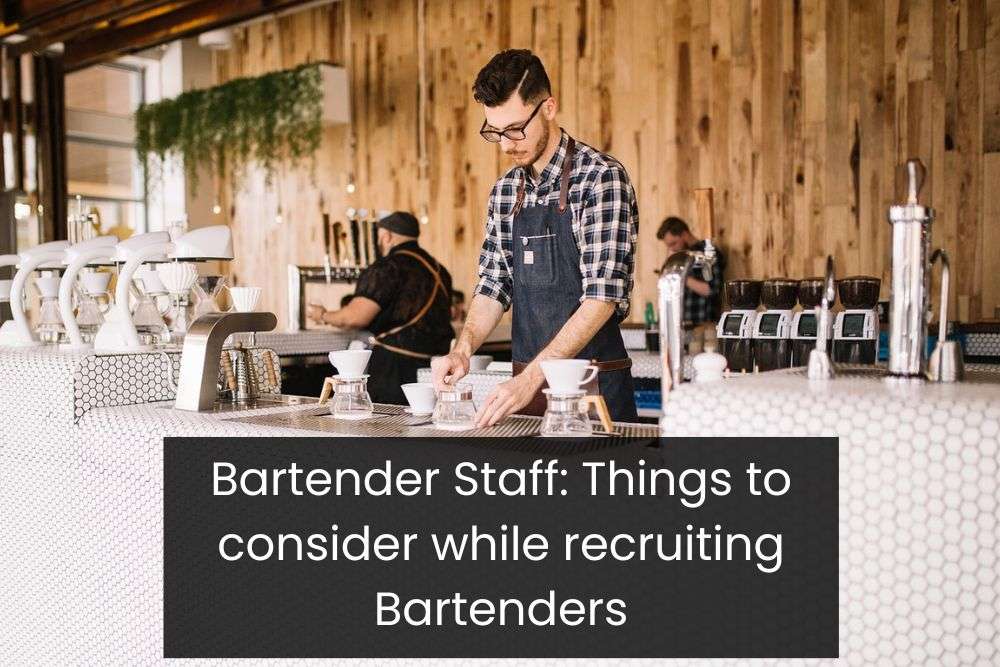In a world where the food and beverage industry is highly competitive, the significance of having exceptional bartenders cannot be overstated. A good bartender staff can turn a casual visitor into a loyal customer. Their ability to mix the perfect cocktail, offer recommendations, and create a welcoming atmosphere can be the defining factor that sets one establishment apart from the rest.
For instance, picture a classy cocktail bar where the bartender not only prepares an outstanding old fashioned but also engages customers in a friendly chat, making them feel like cherished guests. Such an experience is what keeps patrons coming back, spreading the word, and boosting the reputation and revenue of the establishment.
| Key Takeaways |
|---|
| 1. Competitive pay and incentives are crucial for attracting and retaining top bartender talent. Ensure that your compensation structure is transparent and includes performance-based incentives. |
| 2. Benefits and perks, such as health insurance, retirement plans, and employee discounts, enhance job satisfaction and demonstrate your commitment to your bartender staff’s well-being. |
| 3. Comprehensive onboarding, initial training, and ongoing professional development are essential for equipping bartenders with the skills and knowledge they need to excel in their roles. |
| 4. Building employee loyalty, recognizing and rewarding performance, and addressing burnout are effective strategies for retaining bartender staff and creating a positive workplace culture. |
| 5. Recruiting and retaining a talented bartender team is an investment that can significantly impact your establishment’s reputation, customer satisfaction, and overall success in the hospitality industry. |
1 The Role of Recruitment in Ensuring Quality Bartender Staff
The quality of your bartender staff can make or break your business. Recruiting the right talent is the first and most critical step in ensuring a top-notch bar service. The success of any hospitality business heavily relies on the people behind the bar, and their expertise, attitude, and work ethic can significantly influence the overall customer experience.
The recruitment process is the gateway to building a strong bartender team. Without proper recruitment, you risk hiring individuals who may lack the essential skills, attitude, and professionalism needed to represent your establishment. On the other hand, a well-executed recruitment strategy can help you find talented and passionate individuals who will contribute to the success and reputation of your business.
Think of recruitment as the foundation upon which you’ll build your team of bartenders. It’s not just about filling positions; it’s about finding the right fit for your establishment. This process ensures that your team not only serves drinks but also embodies the values and culture of your business.
Looking for Bartender Staff?
Call us at 087 738 8306 or Fill the form below and we will get back to you ASAP.
2 Essential Skills and Qualities
A. Bartending Skills
Mixology Expertise: Mixology expertise is the cornerstone of a great bartender. It goes beyond simply knowing how to pour a drink; it’s about crafting a symphony of flavors in each cocktail. A skilled bartender understands the nuances of spirits, liqueurs, and mixers, allowing them to create well-balanced and innovative concoctions.
They should be proficient in classic cocktails like the Martini, Old Fashioned, and Mojito, as well as modern creations that can set your bar apart. A real-life example that highlights the importance of mixology expertise is the craft cocktail revolution.
Many successful bars and restaurants have gained recognition and a loyal following by offering unique and expertly crafted cocktails. The ability to concoct signature drinks that customers can’t find elsewhere can be a significant draw for your establishment.
Customer Service: Exceptional customer service is at the heart of a bartender’s role. Bartenders are often the face of the establishment, and their interaction with customers can make or break the overall experience. Being friendly, attentive, and approachable is essential. Bartenders should make customers feel welcomed and valued, whether it’s their first visit or they are regulars.
Moreover, customer service isn’t just about being polite; it’s also about knowing how to handle difficult situations. Bartenders may encounter irate customers, underage patrons, or overindulgent guests. The ability to defuse conflicts, check IDs responsibly, and refuse service when necessary while maintaining professionalism is vital.
Take the example of a crowded bar during a major sporting event. A skilled bartender not only serves drinks efficiently but also manages the sometimes rowdy crowd, ensuring a safe and enjoyable atmosphere for all patrons.
Knowledge of Beverages: Bartenders should possess in-depth knowledge of a wide range of beverages. This includes not only alcoholic beverages but also non-alcoholic options, such as mocktails and soft drinks. A thorough understanding of the different types of spirits, wines, and beers is essential. Bartenders should be able to recommend suitable options to customers based on their preferences and pair beverages with food if your establishment offers dining.
Beyond knowing the basics of what’s in stock, a bartender should be well-versed in the art of presentation. Serving wine at the correct temperature, using the right glassware, and garnishing cocktails with precision all contribute to the overall customer experience.For instance, a customer may ask for a wine recommendation to pair with their meal.
A knowledgeable bartender can suggest a complementary wine, enhancing the customer’s dining experience and increasing the likelihood of them returning.
B. Personal Qualities
Communication: Communication is the lifeblood of bartending. Bartenders need to be excellent listeners and communicators. They should be able to engage in meaningful conversations with customers, understanding their preferences, and making personalized drink recommendations.
Moreover, clear and concise communication is vital when taking orders and serving drinks promptly and accurately.Additionally, bartenders often work in teams, so effective communication with co-workers, kitchen staff, and servers is crucial for a smoothly operating establishment.
Imagine a busy Friday night at a bar where customers have various dietary restrictions and preferences. A bartender who can communicate well not only ensures that each patron’s needs are met but also keeps the entire service flow running smoothly.
Attention to Detail: Bartending requires a keen eye for detail. From measuring ingredients precisely to garnishing drinks impeccably, the devil is often in the details. Customers notice when their cocktails are perfectly balanced, and a well-garnished drink can be a work of art in itself.
Attention to detail also extends to hygiene and cleanliness. Bartenders must maintain a spotless bar area, ensuring that glassware and utensils are clean and that spills are promptly cleaned up. A meticulous approach to cleanliness not only meets health and safety standards but also reflects positively on the establishment’s reputation.
In a high-end cocktail lounge, the difference between an ordinary and an outstanding experience can come down to the bartender’s meticulous preparation and presentation of cocktails.
Multitasking: Multitasking is a skill that bartenders must master, as they often deal with multiple tasks simultaneously. They must take orders, prepare drinks, manage cash transactions, and engage with customers—all while maintaining their composure in a fast-paced environment.
Successful multitasking ensures that customers are served promptly, preventing long wait times and ensuring a smooth flow of service. It’s also essential for managing a crowded bar during peak hours when the pressure is on.
Consider a bustling nightclub with a line of customers waiting to order drinks. A bartender who can multitask effectively ensures that everyone receives their drinks in a reasonable amount of time, preventing frustration and keeping the party going.
3 Experience and Training
A. Importance of Prior Experience
Prior experience in bartending can be a significant asset when recruiting bartender staff. Experienced bartenders bring a wealth of knowledge and practical skills to the table. They are often well-versed in various drink recipes, techniques, and the nuances of customer service in a bar setting. This can lead to a smoother onboarding process and faster adaptation to your establishment’s specific needs.
Moreover, experienced bartenders are typically more confident and composed during busy shifts. They know how to handle high-pressure situations, manage customer expectations, and provide exceptional service, which can lead to higher customer satisfaction and repeat business.
However, it’s important to recognize that the importance of prior experience can vary depending on the type of establishment you run. In a high-end cocktail lounge, where customers have high expectations, prior experience may be non-negotiable. On the other hand, in a neighbourhood bar, a passionate and trainable candidate with less experience might be a better fit.
The key is to assess your establishment’s needs and balance the desire for experience with the potential for growth in candidates.
B. Training and Certification
While experience is valuable, training and certification also play a crucial role in ensuring that your bartender staff is well-prepared for the job. Formal training programs, like bartending schools or courses, can provide candidates with a structured education in mixology, customer service, and responsible alcohol service.
Certification programs, such as those for responsible beverage service, can be essential in some jurisdictions to meet legal requirements for serving alcohol. They ensure that your bartenders understand the laws and regulations governing the sale and consumption of alcohol, helping you avoid legal troubles.
It’s important to encourage ongoing education as well. The beverage industry is constantly evolving, with new cocktail trends, spirits, and techniques emerging regularly. Encouraging your bartenders to attend workshops, take online courses, or participate in competitions can help them stay updated and bring fresh ideas to your establishment.
If you are looking for Training and Online Certification, you could check for all our expert vetted courses here
C. Balancing Experience and Training
Finding the right balance between experience and training when recruiting bartender staff is a key challenge. Some candidates may have years of experience but lack formal training, while others may have completed bartending courses but have limited real-world experience.
Balancing these factors depends on your establishment’s specific needs and culture. For example, if you’re opening a new, innovative cocktail bar, you may prioritize candidates with strong mixology training and a willingness to learn. In contrast, an established pub might place greater emphasis on prior experience, especially during peak hours.
One effective approach is to consider a probationary period for new hires, during which their performance is assessed. This period allows you to evaluate how well they adapt to your establishment’s unique requirements and whether their experience or training better suits your needs.
4 Cultural Fit
A. The Role of Bartenders in Shaping the Atmosphere
Bartenders play a pivotal role in shaping the atmosphere and vibe of your establishment. They are not just drink mixers; they are curators of experiences. Your choice of bartender staff can influence whether your bar feels like a lively and energetic sports hangout, a classy and upscale cocktail lounge, or a cozy neighborhood pub.
The ambiance they create can define your bar’s reputation and attract a particular clientele. Bartenders can set the tone by interacting with customers, playing appropriate music, and even the way they garnish and present drinks. Their personalities and styles contribute to the overall feel of the bar.
It’s crucial to consider the desired atmosphere and the role you want your bartenders to play in creating it when recruiting. A bartender who thrives in a fast-paced, energetic environment may not be the best fit for a quiet, intimate wine bar, and vice versa.
B. Aligning with Your Establishment’s Culture
Every bar or restaurant has its unique culture and values. Recruiting bartender staff who align with your establishment’s culture is vital for maintaining consistency and fostering a positive work environment.
For instance, if your bar prides itself on being a welcoming and friendly neighborhood spot, you’ll want bartenders who share those values and are known for their approachability and friendliness. On the other hand, a high-end establishment may prioritize sophistication and professionalism, seeking bartenders who can convey that image.
It’s also about ensuring that your bartenders can collaborate seamlessly with the rest of the staff, from servers to kitchen personnel. An excellent cultural fit helps prevent conflicts and enhances teamwork, contributing to a smooth operation.
C. Team Player or Solo Performer?
The ability to work effectively in a team or as a solo performer is another crucial consideration when recruiting bartender staff. Some bartenders shine when working independently, excelling in settings where they are the sole bartender. They have the confidence to handle a full bar on their own and are adept at multitasking.
Others thrive in a team environment, working alongside other bartenders to manage high-volume shifts. Team players are skilled at communication and coordination, ensuring that drink orders are efficiently handled, even during peak hours.
The choice between a team player and a solo performer depends on your establishment’s layout and customer traffic. A busy nightclub might benefit from team players who can handle large crowds, while a cozy speakeasy may prefer solo performers who create an intimate experience for guests.
It’s also worth considering how well candidates can adapt to different roles. Sometimes, a bartender who excels in a solo role can become a team player with the right training and guidance, and vice versa.
5 Availability and Flexibility
A. Shift Availability
The availability of your bartender staff is a critical factor to consider during the recruitment process. Bars and restaurants often operate during non-traditional hours, including evenings, weekends, and holidays. Hence, it’s essential to ensure that your bartenders can meet the shift requirements of your establishment.
During the hiring process, inquire about the candidates’ availability. It’s not just about their willingness to work different shifts but also their ability to consistently do so. Reliability in showing up for scheduled shifts is crucial for maintaining a smoothly functioning bar.
Additionally, you may want to consider candidates who are open to flexible scheduling, as this can be a significant advantage during busy seasons or unexpected staff shortages. Having a mix of part-time and full-time staff with varying availability can help you create a well-balanced schedule.
B. Handling Busy Periods
Busy periods in the hospitality industry, such as Friday and Saturday nights, holidays, or special events, require a unique set of skills. Bartenders must be adept at handling high volumes of orders and serving customers efficiently while maintaining the quality of service.
When recruiting bartender staff, it’s essential to assess how candidates handle busy periods. Inquire about their experience during peak hours, their strategies for managing crowds, and their ability to stay composed under pressure. Look for candidates who have demonstrated their ability to thrive in a fast-paced environment.
For instance, imagine a sports bar during a championship game where the orders are pouring in, and customers expect quick service. A bartender who can navigate this chaos while providing excellent service is an invaluable asset to the establishment.
C. Adaptability to Changing Schedules
In the hospitality industry, schedules can change due to various factors, including seasonal fluctuations, special events, or unexpected situations. Bartenders need to be adaptable and willing to accommodate changes in their schedules.
When recruiting bartender staff, it’s crucial to assess their flexibility and willingness to adapt to changing schedules. Ask candidates how they’ve handled schedule changes in previous positions and whether they can commit to a certain level of flexibility.
Being able to quickly adapt to a last-minute shift change or covering for a colleague who is unable to work can make a significant difference in maintaining a consistent level of service and keeping customers satisfied.
Looking for Bartender Staff?
Call us at 087 738 8306 or Fill the form below and we will get back to you ASAP.
6 Attitude and Professionalism
A. Work Ethic
Work ethic is a fundamental quality that you should seek in your bartender staff. Bartenders are often the first to arrive and the last to leave, and they play a central role in setting the standard for professionalism in your establishment.

Candidates with a strong work ethic are dedicated, punctual, and take pride in their responsibilities. They are willing to go the extra mile to ensure the satisfaction of customers and the smooth operation of the bar.
To assess work ethic during the recruitment process, you can ask candidates about their previous work experiences, any challenges they’ve overcome, and their personal approach to hard work. Look for examples of when they’ve demonstrated a strong work ethic, such as staying late to help clean up after a busy night or taking on additional responsibilities voluntarily.
B. Handling Difficult Situations
Bartenders often find themselves dealing with challenging situations. These may include unruly or intoxicated customers, conflicts among patrons, or unexpected equipment failures. How a bartender handles these situations can make a significant difference in the safety and reputation of your establishment.
When recruiting bartender staff, assess their ability to handle difficult situations calmly and professionally. Ask them about past experiences where they’ve had to resolve conflicts or manage challenging customers. Look for candidates who are skilled at de-escalation and can maintain a cool head under pressure.
It’s also important to ensure that your bartenders are familiar with the establishment’s policies for handling difficult situations, such as refusing service to intoxicated patrons or managing disputes among customers.
C. Responsible Alcohol Service
Responsible alcohol service is not just a legal requirement but also a fundamental aspect of professionalism in the hospitality industry. Bartenders must be aware of the laws and regulations governing the sale and service of alcohol in their jurisdiction.
During the recruitment process, inquire about the candidates’ knowledge of responsible alcohol service. Ask them about their understanding of checking IDs, recognizing signs of intoxication, and refusing service when necessary. Look for candidates who prioritize the safety and well-being of customers.
Additionally, some candidates may have completed training programs related to responsible beverage service. This can be a valuable asset, as it demonstrates their commitment to upholding the law and ensuring the responsible consumption of alcohol.
For example, in a situation where a customer has had too much to drink and becomes unruly, a bartender who is trained in responsible alcohol service will handle the situation in a way that prioritizes safety and compliance with the law.
7 Screening and Interviewing
A. Crafting Effective Job Postings
Crafting effective job postings is the first step in attracting the right candidates when recruiting bartender staff. Your job postings should be clear, concise, and enticing. They should provide a glimpse of your establishment’s culture, expectations, and the qualities you’re looking for in a bartender.
To create compelling job postings, use descriptive language to highlight the unique aspects of your bar or restaurant. Mention any awards, accolades, or distinctive features that make your establishment stand out. Be specific about the qualifications and skills you’re seeking, and avoid generic phrases.
For instance, if your bar is renowned for its craft cocktails, you might emphasize your commitment to mixology and use phrases like “passionate about creating artisanal cocktails” to attract candidates who share your values.
B. Structuring Interviews
Structuring interviews is essential to ensure that you gather meaningful insights from candidates. An organized interview process allows you to evaluate the candidates consistently and fairly. Typically, a structured interview follows a set format and includes a series of questions that assess the candidate’s skills, experience, and fit with your establishment.
When conducting interviews for bartender staff, consider using a combination of behavioral questions and situational questions. Behavioral questions inquire about past experiences and how candidates have handled specific situations. Situational questions present hypothetical scenarios and ask candidates how they would respond.
Additionally, it’s beneficial to have a panel of interviewers or multiple rounds of interviews to gain different perspectives on the candidates. This can help you make more informed hiring decisions.
C. Role Play and Scenario Questions
Role play and scenario questions are an effective way to assess a candidate’s practical skills and problem-solving abilities. These questions allow candidates to demonstrate how they would handle real-life situations they might encounter on the job.
For example, you could present a scenario in which a customer appears to be over-intoxicated and ask the candidate how they would handle the situation. This provides insights into their knowledge of responsible alcohol service and their ability to manage challenging customer interactions.
Similarly, role play can involve asking candidates to prepare a specific cocktail or demonstrate their bartending skills. This practical aspect of the interview allows you to gauge their mixology expertise, speed, and attention to detail.
By using role play and scenario questions, you can assess a candidate’s ability to apply their skills and knowledge in a bar setting, making the interview process more comprehensive and insightful.
8 Reference Checks and Background Checks
A. The Importance of Checking References
Checking references is a critical step in the recruitment process for bartender staff. References provide insights into a candidate’s past performance, work ethic, and reliability. They offer a glimpse of how the candidate has contributed to previous establishments and how they’ve interacted with colleagues and customers.
When checking references, be sure to contact former employers and colleagues who can speak to the candidate’s skills, character, and suitability for the bartending role. Ask specific questions related to their work history, responsibilities, and any notable achievements.
Additionally, consider reaching out to references who can attest to the candidate’s behavior in a customer-facing role, as this is highly relevant in the hospitality industry.
B. Conducting Background Checks
Conducting background checks is another crucial aspect of the recruitment process, especially in the hospitality industry, where employees often have access to sensitive information and alcohol. Background checks can reveal any criminal history, including convictions related to alcohol, drugs, or violence.
It’s essential to follow legal requirements and regulations when conducting background checks, as these can vary by jurisdiction. Ensure that you obtain the candidate’s consent before proceeding with a background check, and communicate clearly about your intentions.
Background checks are not only about ensuring the safety and reputation of your establishment but also about compliance with legal obligations. Failing to conduct background checks when required can lead to legal consequences.
For instance, in some regions, bartenders must meet specific legal criteria to serve alcohol, and a background check can confirm their eligibility for the role while protecting your establishment from potential liabilities.
9 Compensation and Benefits
A. Competitive Pay and Incentives
Providing competitive pay and incentives is essential when recruiting bartender staff. Bartending is physically demanding and requires a high level of skill, so offering a competitive base salary is the first step in attracting and retaining top talent.
To determine competitive pay, research industry standards in your region and take into account factors like experience and location. You might also consider implementing performance-based incentives, such as tips, bonuses, or commissions. These can motivate bartenders to excel and enhance their income.
Let’s break down competitive pay and incentives in a table:
| Compensation Component | Description |
|---|---|
| Base Salary | A competitive base pay reflecting industry standards and location. |
| Tips and Gratuity | An opportunity for bartenders to earn additional income through tips from customers. |
| Performance Bonuses | Incentives based on performance metrics like sales, customer satisfaction, or upselling. |
| Health Benefits | Health insurance or other wellness benefits can be an attractive perk. |
| Shift Differentials | Additional compensation for working less desirable shifts, like late nights or weekends. |
B. Benefits and Perks
In addition to competitive pay, offering benefits and perks can be a strong selling point for your establishment when recruiting bartender staff. Benefits may include health insurance, retirement plans, and paid time off. These perks demonstrate that you value the well-being and job satisfaction of your bartenders.
Consider what benefits align with the needs and preferences of your bartending team. Flexible scheduling, employee meal discounts, or opportunities for career advancement can also be appealing.
Here’s a table illustrating benefits and perks:
| Benefit/Perk | Description |
|---|---|
| Health Insurance | Comprehensive medical, dental, and vision coverage. |
| Retirement Plans | Options like 401(k) plans with employer contributions. |
| Paid Time Off (PTO) | Paid vacation days and holidays for work-life balance. |
| Employee Discounts | Discounts on meals, drinks, or retail products. |
| Professional Development | Support for bartenders to attend courses, workshops, or industry events. |
C. Fair and Transparent Compensation
Fair and transparent compensation is essential for building trust and retaining bartender staff. It’s crucial to have clear and open communication about how compensation is structured. Ensure that your bartenders understand how their pay is calculated, including tips, incentives, and any deductions.
Moreover, consider implementing a performance evaluation system that allows bartenders to track their progress and see how they can increase their earnings. Transparency in compensation also includes promptly addressing any concerns or discrepancies, ensuring that your bartenders feel valued and fairly compensated for their hard work.
Table: Elements of Fair and Transparent Compensation
| Element | Description |
|---|---|
| Transparent Pay Structure | Clearly defined structure for base pay, tips, and incentives. |
| Regular Performance Reviews | Periodic evaluations with feedback on performance and compensation. |
| Open Door Policy | Encouraging bartenders to discuss compensation concerns or questions. |
| Fair Tip Distribution | Ensuring tips are distributed fairly among all bartending staff. |
| Equal Opportunities | Avoiding discrimination and providing equal compensation for equal work. |
10 Onboarding and Training
A. The Importance of Comprehensive Onboarding
Comprehensive onboarding is a crucial step when integrating new bartenders into your team. It ensures that they understand the expectations, culture, and processes of your establishment. During onboarding, provide new hires with essential information, such as your mission, values, policies, and procedures.
An effective onboarding process helps bartenders become familiar with their roles and responsibilities, equipment, and tools they’ll be using. It also introduces them to your establishment’s specific approach to bartending, whether it’s crafting signature cocktails, providing excellent customer service, or following responsible alcohol service guidelines.
B. Providing Initial Training
Initial training for new bartender staff is the foundation on which they build their skills and knowledge. This training should cover the basics of bartending, including drink recipes, techniques, and customer service. It’s an opportunity to ensure that all bartenders are on the same page and adhere to your establishment’s standards.
Training can be a mix of hands-on practice, shadowing experienced bartenders, and using training manuals or resources. The goal is to equip new hires with the necessary skills to serve customers professionally and efficiently.
C. Ongoing Professional Development
Bartending is an evolving profession with trends and techniques constantly changing. To keep your bartender staff engaged and continually improving, provide opportunities for ongoing professional development. This can include access to advanced training, workshops, and industry events.
Encourage bartenders to pursue certifications, such as mixology courses or responsible beverage service certifications. This not only enhances their skills but also contributes to the prestige of your establishment.
Table: Elements of Ongoing Professional Development
| Element | Description |
|---|---|
| Advanced Training | Access to courses, workshops, or certifications for skill enhancement. |
| Networking Opportunities | Encouraging participation in industry events and competitions. |
| Mentorship Programs | Pairing new bartenders with experienced mentors for guidance. |
| Skill Enhancement | Supporting bartenders in mastering new techniques and trends. |
| Recognition and Rewards | Acknowledging and rewarding continued professional growth. |
11 Retention Strategies
A. Building Employee Loyalty
Building employee loyalty is crucial for retaining bartender staff. When bartenders feel valued and connected to your establishment, they are more likely to stay long-term. To foster loyalty, consider these strategies:
- Create a positive work environment: Encourage camaraderie among staff, provide a safe and inclusive workspace, and prioritize open communication.
- Offer opportunities for growth: Provide bartenders with a path for career advancement within your establishment.
- Show appreciation: Regularly express your gratitude for their hard work, dedication, and contributions.
Building employee loyalty requires a holistic approach that focuses on both professional and personal aspects of their lives.
B. Recognizing and Rewarding Performance
Recognizing and rewarding performance is a powerful retention strategy. Acknowledging your bartenders’ hard work and dedication can boost morale and job satisfaction. Consider these methods:
- Employee of the month programs: Recognize outstanding performance by highlighting a top-performing bartender each month.
- Performance-based incentives: Implement a system where bartenders receive bonuses or rewards based on sales, customer satisfaction, or other performance metrics.
- Milestone celebrations: Celebrate work anniversaries and accomplishments to show appreciation for their commitment.
Recognizing and rewarding performance not only motivates bartenders to excel but also fosters a positive workplace culture.
C. Addressing Burnout
Addressing burnout is essential to keep your bartender staff motivated and engaged. The fast-paced nature of the job can lead to stress and exhaustion. To combat burnout, consider the following strategies:
- Encourage work-life balance: Provide consistent schedules and offer time-off requests to allow bartenders to recharge.
- Support mental health: Offer access to resources or programs that focus on mental well-being and stress management.
- Rotate shifts and tasks: Varying responsibilities and work shifts can prevent monotony and burnout.
By addressing burnout, you demonstrate your commitment to your bartenders’ health and job satisfaction.
Looking for Bartender Staff?
Call us at 087 738 8306 or Fill the form below and we will get back to you ASAP.
Conclusion
In conclusion, recruiting and retaining bartender staff is a critical endeavour in the hospitality industry. Your bartenders play a pivotal role in creating a positive customer experience and contributing to your establishment’s success. To build a strong bartender team, you must carefully consider their skills, personal qualities, and alignment with your establishment’s culture.
Remember, the success of your bar or restaurant depends not only on the beverages you serve but also on the talented individuals who craft and serve them. Building a strong bartender team is an investment that can yield substantial returns in terms of customer loyalty and business growth.













